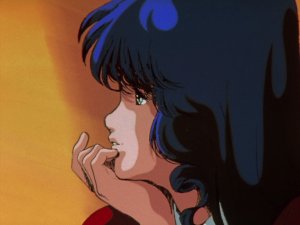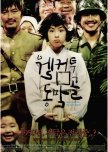Modern war movies have garnered something of a reputation. When one now thinks of the genre, visions of blood-soaked battlefields, blazing weaponry, and mushroom clouds fill the mind. Themes often include brotherhood and the importance of peace, sometimes subtle, often not. How refreshing Welcome to Dongmakgol must be in comparison then, as it gently rejects (if not wholly abandons) all this. Instead, it opts to be one of the most beautiful and imaginative war films ever made.
Simply described, Welcome to Dongmakgol leaves the impression of a Studio Ghibli animation sprung to life. The similarities are numerous, felt from the fanciful bones of the premise, right down to vivid ambiance set by the cinematography. Even music lends itself to the comparison, having been contributed by legendary Joe Hisashi. Little events (such as the incredible, now-famous, popcorn scene) might have been directed by Miyazaki himself. This is all intentional of course, a sure credit to Director Park Kwang Hyun (a self-proclaimed fan of the studio).
As one might glean from the information above, the story maintains elements of fantasy. North and South Korean soldiers, as well as one stranded American, end up meeting in an idyllic little village during the Korean War. They learn that the village, Dongmakgol, has been isolated for so long the inhabitants have no knowledge of the war, or modern technologies in general. From here, it develops into a story of friendship without borders, of innocence that brings happiness and peace, and reconciliation despite old wounds. Sprinkle in a little comedy and a heart-rending scene or two, and you've basically got Welcome to Dongmakgol.
The cast is phenomenal, as are the characters. Veteran actors Jung Jae Young (as North Korean officer Su Hwa) and Shin Ha Kyun (haunted South Korean Lieutenant Pyo) light up the screen. Being able to see both of these talents work together is such a treat, and their interactions with others are simply magnificent. Kang Hye Jung, best known from the Korean classic Oldboy, lands another iconic role here as the innocent and child-like Yeo Il. Together with Ryu Deok Hwan, she rounds up the memorable figures in the cast.
Unfortunately, the western actors were shakier. Steve Taschler doesn’t derail the film as Neil Smith, but his performance is obviously weaker than those around him. His character still manages to be somewhat interesting, despite these issues being combined with limited screen time.
Earlier I mentioned Joe Hisashi; fans of his work will automatically connect this name with quality. Those unfamiliar among you, don’t worry. This is music that has to be heard to be believed. Without his incredible compositions, the effect of the film would be nowhere as strong.
Was this review helpful to you?























